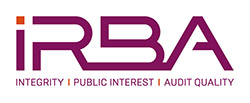IRBA draws attention to the Key Audit Matters in auditor's reports as it relates to COVID-19
|
Johannesburg, Thursday, May 14, 2020 – In light of the COVID-19 pandemic and restrictions arising from lockdown on businesses in South Africa, there has never been a more important time for investors and other stakeholders to pay attention to the Key Audit Matters (KAMs) communicated in the auditor’s report issued by registered auditors on financial statements. The impact on the financial reporting cycle arising from COVID-19 touches on many aspects of business operations and financial reporting and, similarly, on the manner in which the audit is conducted. Says Bernard Agulhas, CEO of the Independent Regulatory Board for Auditors (IRBA), “All the steps in financial reporting are inter-related and are part of an ecosystem which is currently under tremendous pressure and constraint. As the lockdown has progressed, challenges are arising in the preparation of financial statements and the audits thereon, including increased audit risks in areas such as valuations, accounting estimates, going concern assumptions, compliance with laws and regulations and the measurement and disclosure of financial instruments. While the auditing profession must continue to comply with the accounting and auditing standards as well as the IRBA Code of Professional Conduct, we must also realise that it is not business as usual”. In March, the IRBA issued guidance relating to the Implications of the COVID-19 Outbreak on Audits and Auditors as well as guidance on the Impact of COVID-19 on the Auditor’s Report: Going Concern. This guidance sought to address some implications and considerations with regard to audits and audit risks, and specifically highlighted considerations around KAMs in the auditor’s report. KAMs are defined as those matters that, in the auditor’s professional judgement, were of most significance in the audit of the financial statements of the current period and are selected from matters communicated to those charged with governance. They are those matters on which the auditor spends significant time during the audit and believes are sufficiently important to draw to the attention of users of the financial statements and communicate in the auditor’s report. To be useful to the reader, auditors differentiate the value add of their services by providing sufficient information in the auditor’s report which pertains to KAMs, to enable the user to better understand the specific challenges which the auditor encountered during the audit, and how the auditor adapted their audit procedures to respond to those challenges. The COVID-19 pandemic presents a unique set of circumstances and challenges to the financial reporting chain, which preparers and those charged with governance must ensure are sufficiently disclosed in the financial statements. In response, if the matter meets the definition of a KAM, the auditor’s report should also indicate how the auditor addressed these challenges, which might include how the auditor addressed the additional audit risks presented by, for example, valuations, accounting estimates and events which occurred after the financial reporting date. Preparers and auditors are encouraged to communicate useful information in the financial statement disclosures and the auditor’s report, respectively, and investors and other users are encouraged to carefully consider this information in arriving at economic decisions about the company. Concludes Agulhas, “Those charged with governance should carefully consider whether adequate disclosure is being provided by directors in their published financial statements with respect to the impact of the COVID-19 pandemic on the business itself. Auditors should explain in the KAM paragraphs
Ends More about the IRBA: The IRBA is a public protection statutory body established to protect the financial interests of the public by ensuring registered auditors and their firms deliver services of the highest quality. It upholds audit firm independence to ensure that audit quality is such that it enhances the accuracy and credibility of financial performance reporting. In this way, the IRBA has an important role to play in building the reputation of South Africa as an investment market for both local and global investors and driving economic growth for the country. The IRBA also registers suitably qualified accountants as auditors, who must adhere to the highest ethics standards, and promotes the auditing profession through the effective regulation of assurance conducted in accordance with internationally recognised standards and processes.
|





